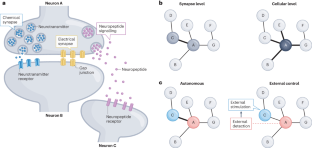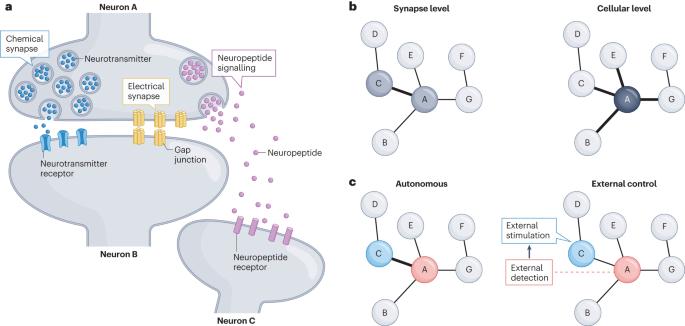Understanding neural circuit function through synaptic engineering
IF 28.7
1区 医学
Q1 NEUROSCIENCES
引用次数: 0
Abstract
Synapses are a key component of neural circuits, facilitating rapid and specific signalling between neurons. Synaptic engineering — the synthetic insertion of new synaptic connections into in vivo neural circuits — is an emerging approach for neural circuit interrogation. This approach is especially powerful for establishing causality in neural circuit structure–function relationships, for emulating synaptic plasticity and for exploring novel patterns of circuit connectivity. Contrary to other approaches for neural circuit manipulation, synaptic engineering targets specific connections between neurons and functions autonomously with no user-controlled external activation. Synaptic engineering has been successfully implemented in several systems and in different forms, including electrical synapses constructed from ectopically expressed connexin gap junction proteins, synthetic optical synapses composed of presynaptic photon-emitting luciferase coupled with postsynaptic light-gated channels, and artificial neuropeptide signalling pathways. This Perspective describes these different methods and how they have been applied, and examines how the field may advance. Synaptic engineering involves the synthetic insertion of new synapses between neurons in vivo. In this Perspective, Rabinowitch, Colón-Ramos and Krieg explore this emerging approach for studying neural circuits, describing the different methods that have been used and how they have been implemented.


通过突触工程了解神经回路功能
突触是神经回路的关键组成部分,可促进神经元之间快速而特异的信号传递。突触工程--在体内神经回路中合成插入新的突触连接--是一种新兴的神经回路研究方法。这种方法尤其适用于确定神经回路结构与功能之间的因果关系、模拟突触可塑性以及探索回路连接的新模式。与其他操纵神经回路的方法不同,突触工程以神经元之间的特定连接为目标,无需用户控制外部激活即可自主发挥作用。突触工程已在多个系统中以不同形式成功实施,包括由异位表达的连接蛋白缝隙连接蛋白构建的电突触、由突触前光子发射荧光素酶与突触后光门控通道组成的合成光突触,以及人工神经肽信号通路。本视角介绍了这些不同的方法及其应用方式,并探讨了该领域可能的发展方向。
本文章由计算机程序翻译,如有差异,请以英文原文为准。
求助全文
约1分钟内获得全文
求助全文
来源期刊

Nature Reviews Neuroscience
NEUROSCIENCES-
自引率
0.60%
发文量
104
期刊介绍:
Nature Reviews Neuroscience is a multidisciplinary journal that covers various fields within neuroscience, aiming to offer a comprehensive understanding of the structure and function of the central nervous system. Advances in molecular, developmental, and cognitive neuroscience, facilitated by powerful experimental techniques and theoretical approaches, have made enduring neurobiological questions more accessible. Nature Reviews Neuroscience serves as a reliable and accessible resource, addressing the breadth and depth of modern neuroscience. It acts as an authoritative and engaging reference for scientists interested in all aspects of neuroscience.
 求助内容:
求助内容: 应助结果提醒方式:
应助结果提醒方式:


